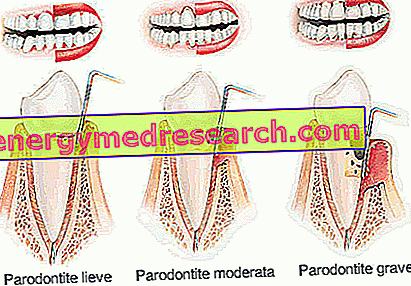Generality
The burning of the tongue is a symptom, also known as glossopirosis, which manifests itself with an annoying, more or less generalized, burning sensation.

The burning of the tongue may depend on numerous causes, whether localized (wounds caused by pointed teeth or incongruous prostheses, burns, exposure to irritants, allergic contact stomatitis, etc.), or systemic (such as scarlet fever, diabetes, drug therapies, emotional stress) and hormonal disorders).
Depending on the cause triggered, glossopirosis may be associated with other symptoms, including pain, dry mouth, taste changes, numbness or tingling of one or more areas of the tongue.
Given the wide spectrum of possible causes, the characteristics of burning tongue and the onset of this disorder in relation to other symptoms are important for the differential diagnosis. If this manifestation is recurrent or persists longer than necessary, it is important to consult a doctor for the appropriate checks.
In some cases, tongue burning tends to resolve spontaneously within a few days, but some remedies can be used to obtain more or less lasting relief. Other times, instead, therapeutic interventions aimed at solving the underlying cause are necessary.
What's this
What is a Burning Out Language?
Tongue burning is a symptom referred to as a burning sensation of varying severity, which can be associated with pain, dry mouth, impaired taste sensitivity and numbness.
The burning may occur suddenly or gradually and mainly affects the back and tip of the tongue .
Causes and Risk Factors
Burning with the Language: what is it caused by?
Tongue burning is an annoying sensation that recognizes various local and systemic causes. In some cases, it is difficult to identify the specific reason behind this symptom.
Nutrition and lifestyle
The most trivial reason behind the burning sensation in the tongue is the ingestion of foods that are too hot, spicy, spicy or acid (eg lemon, grapefruit, tomato and citrus). In this case, the event can last for a few hours or a few days.
The burning sensation in the tongue can also be associated with tobacco smoke and the habitual consumption of alcohol and beverages containing caffeine or other stimulants (eg coffee, tea and cola).
Burning with the language: local factors
The main local factors that predispose to burning in the tongue are irritation, chronic trauma and lesions involving the mucous membrane of the oral cavity.
In particular, these conditions may be secondary to:
- Mechanical irritations caused by incongruous dental prostheses, sharp teeth or dental appliances;
- Occlusal discrepancy ;
- Flawed and parafunctional chewing habits, represented by:
- Bruxism (ie the grinding of teeth during the night);
- Window (which consists of tightening the teeth with excessive force);
- Hypermobility of the tongue;
- Xerostomia (oral dryness);
- Burns .
The burning of the tongue may also occur in the event of:
- Food allergies ;
- Allergic contact reactions to:
- Materials used in conservative dentistry;
- Acrylic components of removable prostheses;
- Oral hygiene products, such as toothpaste and mouthwashes;
- Map language ;
- Oral Lichen planus .
As for the possible causes of irritation, the burning sensation in the tongue can also be associated with:
- Infections of the mucous membranes of the oral cavity, such as:
- Candidiasis ( Candida albicans infection);
- Cold sores;
- Altered function of the salivary glands, with qualitative and quantitative changes in saliva;
- Aphthous stomatitis;
- Frequent episodes of vomiting;
- Chronic gastritis.
Even the gastroesophageal reflux, when it is particularly severe, can be felt up to the oral cavity, evoking a burning sensation. Tongue burns can also be a sign of a tongue tumor .
Burning mouth syndrome
A burning sensation felt at the level of the tongue (especially on the back and on the tip) or generalized to the whole oral mucosa can indicate the presence of the burning mouth syndrome (also called burning mouth syndrome).
This pathological condition does not have a clear etiology, but it seems to be favored by:
- Nerve lesions (eg trigeminal neuralgia and acoustic nerve neuroma);
- Chronic local traumas;
- Disorders of psychosomatic origin;
- Hormonal imbalances (especially an estrogenic deficit, given the higher incidence in post-menopausal women).
Glossitis (tongue inflammation)
If the lingual mucosa appears red, with fringed edges, and on it the impressions of the teeth remain, there may be an underlying local inflammation, called glossitis . In this case, besides the reddening and swelling of the tongue, burning, pain, thickening or atrophy of the taste buds, a sense of dryness and desquamation typically appear.
Glossitis can be caused by infections (including herpes simplex, candidiasis, syphilis and scarlet fever), wounds caused by sharp teeth or prostheses, burns and nutritional deficiencies (especially vitamins B12, folic acid, niacin, iron or zinc).
In the glossitis, the burning of the tongue is accentuated with chewing; pain can even make it difficult to swallow; in some cases, this disorder can also alter the perception of taste.
Systemic causes of burning with the tongue
The tongue burning can manifest itself in the context of generalized skin diseases and malabsorption syndromes, such as celiac disease. This symptom can also be induced by stress and some psychosomatic or psychiatric disorders (such as anxiety and depression). The burning of the tongue can also be the side effect of some drugs and of radiation therapy .
Furthermore, when the tongue burns and is more reddened than usual, it is possible that at the origin there are nutritional deficiencies, especially minerals (iron or zinc) and vitamins (B1, B2, B6, B12, folic acid and niacin). This situation is found, for example, during therapies with antibiotics, which alter the intestinal bacterial flora and can make it difficult to absorb vitamins and other nutrients.
Other causes of systemic burning of the tongue include:
- Diabetes;
- Iron deficiency anemia;
- Sjögren syndrome;
- Menopause;
- Liver disorders (eg cirrhosis);
- Thyroid dysfunction, such as hypothyroidism;
- Amyloidosis;
- Vascular malformations;
- Scarlet fever and other exanthematous diseases, such as measles and rubella;
- Immunodeficiency (in particular, from HIV).
Symptoms and Complications
Burning language: how does it manifest itself?
The burning sensation on the tongue manifests itself as an annoying burning sensation of variable gravity, accompanied or not by pain, redness and swelling. This set of symptoms can be more or less generalized.
Possible associated disorders
The tongue burning can be associated with other manifestations, such as:
- Tingling or numbness of the tip of the tongue;
- Bitter or metallic taste;
- Dry mouth (xerostomia);
- Increased thirst.
Burning with the language: when does it manifest itself?
The burning sensation in the tongue can arise in a sudden or gradual manner (that is, worsening during the day, without any substance reliably relieving it); in other cases, however, the disorder is only transitory or has a continuous course, with temporary remissions. Usually, the burning sensation in the tongue is aggravated during meals and can be associated with the difficulty in swallowing.
This manifestation can affect other sensations (tactile, thermal and gustatory), altering them.
The duration of the burning can vary from a few hours to several years.
Diagnosis
Burning with the Language: when to go to the doctor?
If the disorder does not show signs of regressing within a few days or in the presence of one of the associated diseases, it is advisable to consult your doctor. The clinical evaluation of tongue burning is quite complex, since the spectrum of possible causes is very broad.
Burning with the Language: which exams are indicated?
Based on the diagnostic suspicion and the evidences found during the inspection of the oral cavity, aiming above all to exclude preventively the presence of lesions, it is possible that clinical and laboratory tests are indicated, including:
- Blood analysis to ascertain any haematochemical alterations:
- Blood count with leukocyte formula;
- Glycemia;
- Glycosylated hemoglobin;
- Azotemia:
- VES;
- Sideremia, ferritin and transferrin saturation index;
- transaminases;
- Serological research for hepatitis B and C antibodies;
- Thyroid Screening;
- Dosage of vitamin B12 and serum folate;
- Skin allergy tests (patch-test) for dental materials and probable food or other allergens;
- Oral mucosal buffer and culture microbiological examination for the detection of fungal and bacterial infections;
- Ultrasound of salivary glands, if salivation disorders are suspected due to primitive glandular pathologies;
- Chemical examination of saliva;
- Search for antibodies against Helicobacter pylori and possible gastroenterological counseling, to exclude pathologies of the digestive system;
- Biopsy.
The psychosomatic origin of burning in the tongue must be taken into consideration when all possible organic causes are excluded.
In the diagnosis phase it is also important to ascertain any ongoing pharmacological therapies that may have altered the oral microenvironment (as in the case, for example, of antibiotic, antihypertensive and antihistamine therapies).
Treatment and Remedies
Burning with the language: how can it be treated?
There is no specific therapy for burning the tongue; the condition usually regresses once the underlying pathology is successfully treated and whose glossopirosis is only a symptom . However, some precautions can help solve or minimize the problem.
The first approach to burning the tongue consists in removing any aggravating or triggering factors at the local level, such as spicy foods and potentially irritating oral products (for example, opt for alcohol-free mouthwashes and toothpastes with flavor enhancers and flavorings).
Depending on the causes, a possible tongue burning treatment could consist of the use of drugs:
- Antifungals or antibiotics if an infection is detected;
- Anxiolytics or antidepressants given to treat anxiety;
- Antihistamines to limit reactivity to certain substances;
- Salivary substitutes .
This set of medicines can be used, with the advice of your doctor, in combination with some topical approaches, such as local anesthetics (lidocaine), antiseptic and refreshing gels or products based on capsaicin (a substance that "fools" the receptors that mediate the burning sensation).
Remedies to counteract the burning of the tongue
To get temporary relief, you can then put into practice some home remedies such as:
- Put a piece of ice in your mouth (intense cold refreshes and at the same time puts the mouth to sleep, reducing the burning sensation);
- Drink small amounts of water often.
In any case, it is advisable:
- Adopt a balanced diet, avoiding foods that are too hot or spicy;
- Stop smoking;
- Abolish alcoholic beverages;
- Suspend pharmacological treatments that are not strictly necessary.



